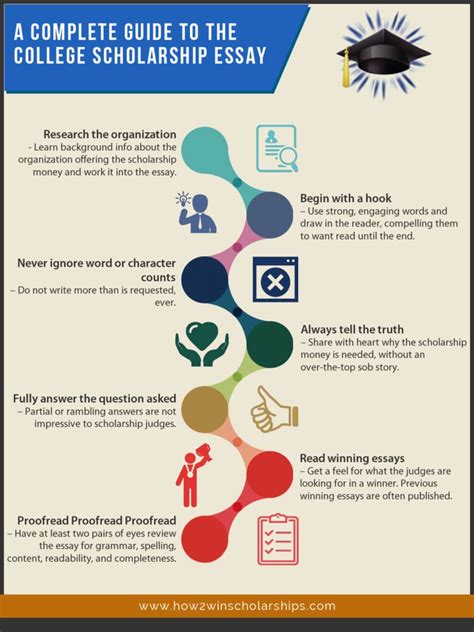Securing scholarships that require essays can be a daunting task, but it’s an opportunity to showcase your writing skills and demonstrate your academic abilities. This comprehensive guide will provide you with everything you need to know about scholarships that require essays, from identifying eligible opportunities to crafting a compelling essay that will impress the judges.

Benefits of Applying for Scholarships that Require Essays
Beyond the financial assistance they provide, scholarships that require essays offer several key benefits:
-
Enhanced Writing Skills: The essay writing process allows you to develop and refine your writing abilities, which are crucial for academic and professional success.
-
Scholarship Portfolio: A collection of scholarship essays can create a portfolio that showcases your writing skills and academic achievements.
-
Competitive Advantage: Demonstrating your ability to write a well-crafted essay can give you an edge over other scholarship applicants who may not possess strong writing skills.
-
Personal Growth: Reflecting on your experiences and expressing your thoughts and ideas through writing can promote personal growth and self-discovery.
Identifying Eligible Scholarships
The first step in applying for scholarships that require essays is to identify eligible opportunities. Here are some tips for finding scholarships that align with your qualifications and interests:
-
Online Scholarship Databases: Explore reputable databases such as Fastweb, Scholarships.com, and CollegeBoard to search for scholarships based on specific criteria, including those that require essays.
-
College and University Websites: Check the websites of colleges and universities you’re interested in for scholarships offered by the institution and external sponsors.
-
Scholarship Search Engines: Use scholarship search engines like Scholly and Cappex to cast a wide net and discover scholarships that may not be easily accessible through other channels.
-
Guidance Counselors and Teachers: Reach out to your guidance counselor or teachers for recommendations and information about scholarship opportunities that require essays.
Crafting a Compelling Essay
Once you have identified eligible scholarships, it’s time to craft a compelling essay that will persuade the judges to award you the scholarship. Here are some strategies to follow:
-
Understand the Prompt: Carefully read the scholarship prompt and identify the specific question or topic you are asked to address.
-
Brainstorm and Outline: Jot down ideas, generate an outline, and organize your thoughts before writing your essay.
-
Show, Don’t Tell: Use vivid language, anecdotes, and concrete examples to illustrate your experiences and make your writing engaging.
-
Demonstrate Impact: Explain how your experiences or achievements have made a difference in your life or the lives of others.
-
Proofread and Edit: Carefully review your essay for errors in grammar, spelling, and punctuation. Consider seeking feedback from a teacher, guidance counselor, or trusted friend to refine your writing.
Sample Scholarship Essay Prompts
To give you an idea of the types of essay prompts you may encounter, here are a few sample prompts from actual scholarships:
-
Bill and Melinda Gates Foundation Scholarship: “What is your personal vision for a more equitable and just world, and what steps will you take to achieve it?”
-
Coca-Cola Scholars Foundation Scholarship: “Describe a time when you faced a difficult challenge or setback. How did you overcome it, and what did you learn from the experience?”
-
Horatio Alger Scholarship: “Share your story of overcoming adversity to achieve success, both inside and outside the classroom.”
Additional Tips for Success
In addition to crafting a compelling essay, consider the following tips to increase your chances of success:
-
Start Early: Allow yourself ample time to research scholarships and write your essays. Avoid procrastination and submit your applications before deadlines.
-
Follow Instructions: Carefully follow the scholarship application instructions and submit all required materials, including your essay.
-
Be Yourself: Authenticity is key. Write in your own voice and share your genuine experiences and aspirations.
-
Proof of Impact: Provide evidence of your impact through letters of recommendation, transcripts, or community service documentation.
-
Seek External Feedback: Ask a trusted mentor, teacher, or friend to review your essay and provide constructive criticism.
Frequently Asked Questions
Q1. How many scholarships should I apply for?
A1. Apply for as many scholarships as you can find that align with your qualifications and interests.
Q2. Can I reuse my scholarship essays for multiple applications?
A2. While you can adapt your essays for different scholarships, it’s important to tailor each essay to the specific prompt and requirements.
Q3. What should I do if I have a low GPA?
A3. Many scholarships do not have GPA requirements. Focus on your strengths, such as your writing skills and community involvement.
Q4. Can I apply for scholarships that require essays if I’m an international student?
A4. Yes, many scholarships are open to international students. Check the eligibility requirements carefully.
Q5. How long should my scholarship essay be?
A5. Essay length varies depending on the scholarship requirements. Typically, essays should be between 500-1000 words.
Q6. What are some common scholarship essay topics?
A6. Common topics include overcoming challenges, personal growth, community service, and your aspirations for the future.
Conclusion
Applying for scholarships that require essays is an excellent opportunity to enhance your writing skills, showcase your academic abilities, and gain financial assistance. By following the steps and strategies outlined in this guide, you can increase your chances of success and secure the scholarship funding you need to pursue your educational dreams. Remember, the key is to be authentic, compelling, and persistent. With hard work and determination, you can unlock your full potential and achieve your scholarship goals.
